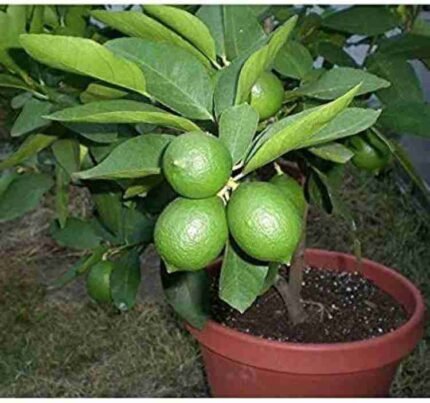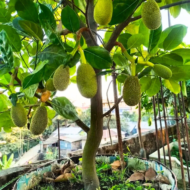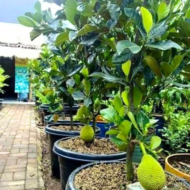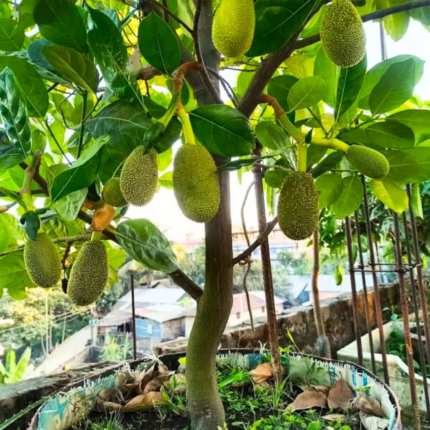Tree
- The jackfruit tree is a large evergreen tree that can grow up to 10–20 meters in height.
- The tree has a wide, dense canopy with large, dark green, glossy leaves.
- Its trunk is sturdy, and the bark is rough and grayish-brown. The jackfruit tree thrives in tropical and subtropical climates, making it a common sight in many Indian states.
Leaves
- The leaves of the jackfruit tree are large, leathery, and oblong, with pointed tips.
- The upper surface is smooth and dark green, while the lower surface is paler with noticeable veins.
Flowers
- Jackfruit trees produce small, unisexual flowers that are usually hidden within a central cluster called a “syncarp.”
- Male and female flowers appear separately on the same tree, but the fruit develops from the female flowers.
Fruit
- The jackfruit is a massive fruit, often growing up to 80 cm in length and weighing as much as 55 kg. However, the average fruit is typically between 10-25 kg.
- The outer skin is thick, green, and spiky, while the inner fruit is made up of multiple yellow-orange pods or bulbs.
- The fruit’s flesh is sweet and fibrous when ripe, with a distinct flavor and aroma, while unripe jackfruit is often used in savory dishes due to its neutral, meaty texture.
Growth and Cultivation in India
- Climate:
- Jackfruit thrives in tropical climates and is primarily grown in the southern and eastern parts of India, including Kerala, Tamil Nadu, Karnataka, Andhra Pradesh, and West Bengal.
- It prefers warm, humid conditions with temperatures ranging from 25°C to 35°C and needs regular rainfall for optimal growth.
- Soil:
- Jackfruit trees grow best in well-drained, fertile soils with a pH between 5.5 and 7.0.
- They can tolerate a variety of soil types, including sandy, loamy, and clayey soils, as long as there is good drainage.
- Propagation:
- Jackfruit is usually propagated through seeds, but vegetative methods like grafting and root suckers are also used for maintaining consistency in quality and fruit production.
- Grafted trees typically bear fruit faster than seed-grown trees.
- Watering and Irrigation:
- Jackfruit trees require consistent moisture, especially during the flowering and fruiting stages. However, they can tolerate some drought conditions once established.
- In dry regions, drip irrigation is commonly used to maintain optimal soil moisture levels.
- Pruning:
- Pruning is necessary to maintain the tree’s shape and prevent excessive growth.
- Regular pruning also helps in removing dead or diseased branches and improving air circulation, leading to better fruit production.
Uses and Benefits in India
- Nutritional Value:
- Jackfruit is an excellent source of dietary fiber, vitamin C, vitamin A, potassium, and antioxidants.
- It is low in fat and rich in carbohydrates, particularly in the form of natural sugars and starches, making it an energy-dense fruit.
- Culinary Uses:
- Ripe Jackfruit: When ripe, the fruit’s sweet, fibrous pods are eaten fresh, or they are used in desserts like jackfruit halwa, cakes, or ice cream.
- Unripe Jackfruit: Unripe jackfruit has a neutral flavor and meat-like texture, making it popular in savory dishes like curries, stir-fries, and even as a substitute for meat in vegetarian and vegan recipes (often referred to as “vegetable meat”).
- Jackfruit is also used in pickles, chutneys, and various street foods in India, such as “kathal ke kebabs.”
- Medicinal Properties:
- Various parts of the jackfruit plant, including its leaves, seeds, and bark, are used in traditional Indian medicine.
- The fruit is believed to have multiple health benefits, including improving digestion, boosting the immune system, regulating blood sugar levels, and promoting heart health.
- Jackfruit seeds are rich in protein and are often roasted or ground into flour, which is used to make snacks or added to flour mixtures for baking.
- Economic Importance:
- Jackfruit is a significant agricultural product in India, where it is consumed widely both in fresh and processed forms. It is an important source of income for smallholder farmers, particularly in rural areas.
- The fruit has gained attention globally as a meat substitute, which has led to an increasing demand for processed jackfruit products in international markets.
- Environmental Benefits:
- Jackfruit trees are hardy and can grow in marginal soils, providing an important source of food in areas where other crops might not thrive.
- The tree is also known for its ability to grow quickly, providing shade and shelter in agroforestry systems, contributing to environmental sustainability.
Varieties
There are several varieties of jackfruit in India, each with its own distinct characteristics, such as:
- Varikka: Known for its small to medium-sized fruit and rich, sweet flavor, commonly found in Kerala.
- Ripe Jackfruit (Chakka): A variety with large, sweet pods often eaten fresh or used in desserts.
- Kathal: The unripe variety used in savory dishes and popular in states like Uttar Pradesh, Bihar, and Bengal.
Pests and Diseases
Jackfruit trees can be affected by a range of pests and diseases, including:
- Fruit flies: Which can damage the fruit by laying eggs inside it.
- Caterpillars: Which feed on the leaves and fruit, leading to reduced productivity.
- Root rot and fungal diseases: Which can affect the health of the tree.
Proper pest management practices, including the use of natural predators, organic pesticides, and regular monitoring, are essential for maintaining healthy jackfruit orchards.











Mr. Mackay –
A seemingly elegant design can quickly begin to bloat with unexpected content or break under the weight of actual activity. Fake data can ensure a nice looking layout but it doesn’t reflect what a living, breathing application must endure.